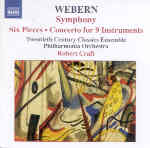Robert Craft’s advocacy on behalf of Anton Webern dates back to his “complete” pioneering 1954 cycle for Columbia Masterworks. Since that time, of course, musicians have absorbed these scores with increasing refinement and accuracy. The same can be said in regard to recording engineers and digital technology. These are all good reasons for Craft to embark on a brand new Webern cycle.
The 11 opus-numbered pieces included in this first volume represent an ideal sampling of chamber, solo, vocal, and orchestral work to attract listeners who want to get to know the composer’s concise and extremely concentrated “pocket music” style. Best of all, the performances are all we could wish for.
Craft elicits impressive clarity and delicacy from the Philharmonia Orchestra in the two-movement Op. 21 Symphony and in the Six Pieces Op. 6 (even the super-soft tam-tam strokes in the latter’s fourth piece make themselves felt) while imparting a welcome conversational sensibility to the Concerto for Nine Instruments’ mosaic-like scoring. Both violinist Jesse Mills and cellist Fred Sherry prove more eloquent foils to their respective, expressionistically aggressive DG Boulez/Webern edition counterparts in Op. 7 and Op. 11.
Much as I admire DG soprano Christiane Oelze’s frightening accuracy and tonal evenness in the Op. 16, 17, and 18 song groups, Jennifer Welch-Babidge manipulates her smaller voice to more playful effect, abetted by her like-minded instrumental collaborators. Christopher Oldfather’s limpid, direct account of the Op. 27 Variations merits special mention, even in the face of Piotr Anderszewski’s extraordinarily detailed reference version (Virgin Classics). Lastly, Craft’s booklet notes match the intelligence and insight of his music making. May subsequent volumes of the Naxos Robert Craft Webern Edition share this one’s sonic and interpretive distinctions. [8/31/2005]
































